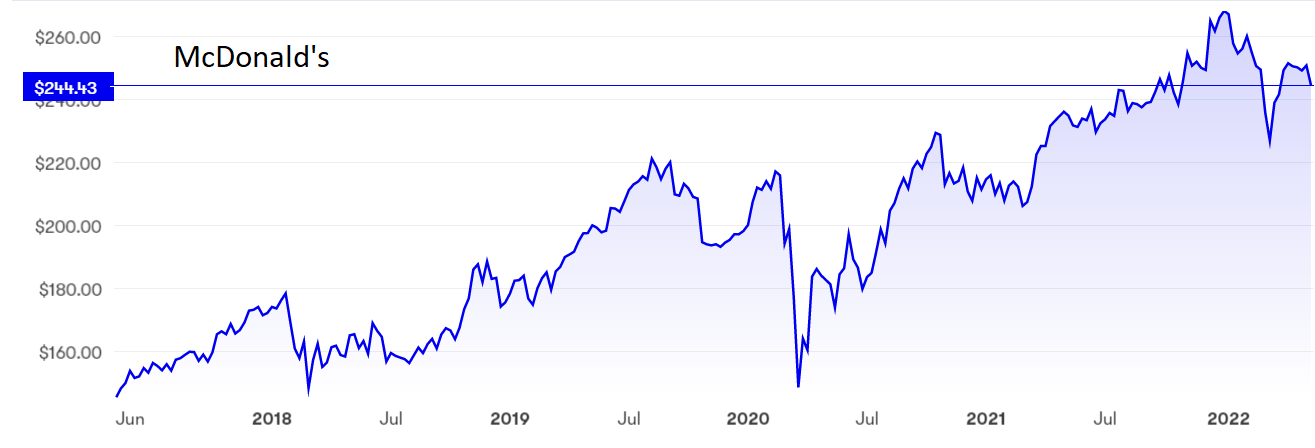The benefits of buying shares in a resilient global brand
13th May 2022 08:07
by Rodney Hobson from interactive investor
A solid performer over fiver years and now outperforming the S&P 500 by miles in 2022, our overseas investing expert continues to back this high street star.

The fallout from the Russian invasion of Ukraine continues to make an impact on first quarter results from a wide range of companies and, with no end to the conflict in sight, the effects are going to be long term. Investors would do well to look at companies that have well-known brands with a strong worldwide presence that could ameliorate this setback.
One possibility is fast food chain McDonald's Corp (NYSE:MCD). Haute cuisine it ain’t, but you know what you are getting and customers have flocked back as pandemic restrictions have eased.
The suspension of operations in Russia and Ukraine cost $127 million in the first three months of 2022. McDonald’s refers to this as “temporary”. It has paid employees’ wages and honoured its obligations to suppliers and landlords even though food already in the supply chain will have to be given away or wasted.
This is a serious blow to McDonald’s, which was understandably reluctant to sever its ties with a market that accounted for 9% of its revenue. Unless there is a dramatic change in circumstances in Ukraine, at some point McDonald’s will have to cut its losses, however commendable its stance on fulfilling its obligations may be. It estimates that paying staff is costing $55 million a month. That kind of burden is not sustainable.
- How high could US interest rates really go?
- Recessions are becoming more likely – here’s how to invest
- Warren Buffett: stocks I’m buying and AGM comments
The hit meant that net income and earnings per share fell 28% to $1.1 billion and $1.48 respectively. However, the potential for the chain is demonstrated by an 11% rise in revenue to $5.67 billion, beating analysts’ expectations, as international sales soared 12% on a comparable basis and 20% if new openings are included. This despite the closure of outlets in Russia and Ukraine.
Further restaurant openings are expected to contribute an extra 1.5% this year, which will at least ameliorate the lost revenue from Russia.
McDonald’s has been a remarkably resilient brand, expanding into new territories – there are now 40,000 outlets in more than 100 countries – and introducing new eye-catching items to its menus. It did look as if the bubble had burst a decade ago when sales started a seven-year decline, but they have bounced back since the depths of the pandemic despite McDonald’s operating in a sector that took the full brunt of global lockdowns.
Following the relaunch of the highly successful customer loyalty scheme, revenue is already back to pre-pandemic levels and the group continues to generate cash. McDonald’s has even managed to pass on increased costs through higher prices.
The possibility of an inflation-induced recession in key markets should not raise concerns despite some signs that customers are already switching to lower-priced items. People will continue to buy cheap fast food; indeed, it is likely that consumers currently dining at more expensive restaurants will switch to McDonald’s.
It is not surprising, then, that the shares have been a consistently profitable performer since 2004 and even gained ground during the financial crash in 2008. Over the past five years they are up 70%.

Source: interactive investor. Past performance is not a guide to future performance.
McDonald’s has also been a consistent dividend payer, which will lessen the impact if shares start to slide, and enhance the upturn if the market shrugs off the current round of global setbacks. The company has increased its dividend in each of the past 13 years and has sufficient free cash flow to make that 14.
- US earnings season calendar here
- Want to buy and sell international shares? It’s easy to do. Here’s how
The shares peaked at $268 in the final trading session of 2021 but they have come off the boil to stand at $244. The yield is 2.2%, not brilliant but quite satisfactory given the scope for future dividend increases.
Hobson’s choice: I first tipped McDonald’s at $219 three years ago and have repeated the buy advice several times, most recently at $258 before the invasion of Ukraine. The stock is still worth buying.
Rodney Hobson is a freelance contributor and not a direct employee of interactive investor.
These articles are provided for information purposes only. Occasionally, an opinion about whether to buy or sell a specific investment may be provided by third parties. The content is not intended to be a personal recommendation to buy or sell any financial instrument or product, or to adopt any investment strategy as it is not provided based on an assessment of your investing knowledge and experience, your financial situation or your investment objectives. The value of your investments, and the income derived from them, may go down as well as up. You may not get back all the money that you invest. The investments referred to in this article may not be suitable for all investors, and if in doubt, an investor should seek advice from a qualified investment adviser.
Full performance can be found on the company or index summary page on the interactive investor website. Simply click on the company's or index name highlighted in the article.
Disclosure
We use a combination of fundamental and technical analysis in forming our view as to the valuation and prospects of an investment. Where relevant we have set out those particular matters we think are important in the above article, but further detail can be found here.
Please note that our article on this investment should not be considered to be a regular publication.
Details of all recommendations issued by ii during the previous 12-month period can be found here.
ii adheres to a strict code of conduct. Contributors may hold shares or have other interests in companies included in these portfolios, which could create a conflict of interests. Contributors intending to write about any financial instruments in which they have an interest are required to disclose such interest to ii and in the article itself. ii will at all times consider whether such interest impairs the objectivity of the recommendation.
In addition, individuals involved in the production of investment articles are subject to a personal account dealing restriction, which prevents them from placing a transaction in the specified instrument(s) for a period before and for five working days after such publication. This is to avoid personal interests conflicting with the interests of the recipients of those investment articles.